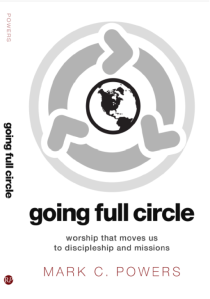 Do you like success stories? Check out this article by John Brewer of First Baptist Mustang Oklahoma. John gets it when it comes to Missional thinking. You might have noticed that I have not posted a blog here since January. This neglect of my blog was not planned or on purpose, but a matter of being too busy. John’s article, though, has inspired me and shown me that my Missional voice needs to stay strong. So I will get back to posting regularly here this week. Thanks John. May his story inspire you to Missional action:
Do you like success stories? Check out this article by John Brewer of First Baptist Mustang Oklahoma. John gets it when it comes to Missional thinking. You might have noticed that I have not posted a blog here since January. This neglect of my blog was not planned or on purpose, but a matter of being too busy. John’s article, though, has inspired me and shown me that my Missional voice needs to stay strong. So I will get back to posting regularly here this week. Thanks John. May his story inspire you to Missional action:
Let the Levites Arise: Making Your Worship Team An Outreach Ministry
Presented at Fisher-Brewer Worship Retreat, Lee University, Chattanooga TN, April 2017
“Then the Levites arose.” I love these words. They are used several times in Scripture to describe the swift action by the Levitical priests to answer the call of the Lord to do something great. The Levites were in charge of Yahweh’s worship among the Israelites and were to take their job seriously. They were a people of action and when they were obedient, they did some pretty amazing things for the name of the Lord. I fear that many worship pastors are missing the full extent of their “Levitical” ministry because we have fallen asleep and grown lethargic in today’s post-christian culture. In our hands lies one of the greatest gifts God has given to all of humanity: music. The power of music comes from its ability to engage a person’s emotions on a deep level and change lives by presenting God’s Word in the beautiful form of a song.
It is entirely possible that we have become comfortable with crafting the perfect worship set for each Sunday morning while failing to engage the lost world with one of the most powerful weapons of spiritual warfare at our disposal. And as effective and powerful as productions can be, I do think it requires more than a weekend long Christmas, come-all event after which we check off our evangelism box for the year.
The truth of the matter is, even if we create a church culture that the lost world was inclined to visit on a whim, the biblical model of evangelism is still one in which the Church moves beyond its four walls and engages the community rather than expecting the community to come inside our four walls and seek to be engaged. This then begs the question: if we believe that music has the power to move and stir the soul and God still saves sinners through the proclamation of His gospel, then why do we not make full use of these two weapons (music and God’s gospel) together for the sake of seeing sinners saved and the darkness vanquished? How can we be more creative and find ways to leave the church building and engage the community around us?
First, we must acknowledge that too many worship leaders view themselves as only church musicians, completely neglecting the fact that God has given them a specific group of people that they are called to shepherd, oversee and disciple. We are so much more than “professional musicians.” We are pastors called to lead those whom God has given us. Our musicians should be more mature followers of Christ after serving in our music ministry than they were before they joined.
Part of helping people grow to be mature followers of Christ is leading them to makedisciples of all nations. Too often, we think that’s the job of someone else on staff. The truth is, though, we often have more time with particular individuals throughout the week than any other person on the pastoral team. What a responsibility we have as we invest in the spiritual growth and development of these whom God has entrusted to us!
Whether you lead a small praise team and rhythm section, or you have a large choir and orchestra, God has given you a band of soldiers that if properly challenged and equipped, could engage the outside world in a very unique way for the sake of Christ. No one else in your church is capable of doing what you can for your musicians or what you all can do as a team. That is what makes you special within your church and to the watching world as well.
When I joined the staff at my current church 7 years ago, I felt the conviction to change what our worship ministry did for Christmas. While a large scale production still sees incredible fruit for the gospel at many churches, it was no longer serving this purpose at my church. With the blessing of the pastor (which is incredibly important, by the way) we began taking our worship ministry into the community. Over the course of several years, we have performed for various homeless rescue missions, correctional facilities, inner-city foster care and early childhood programs, at risk teen centers, and programs for families and caretakers of children with special needs. While our audiences are not as large as packing our worship center for a musical, the residual effects that have permeated the minds and hearts of our people as they serve the “least of these” has slowly begun to change the DNA of our worship ministry.
This outreach culture has also sharpened the focus of our student and children’s choirs as well. This year, our student choir went to Nashville and sang for rescue missions, juvenile detention centers, after school programs, homeless ministries, and senior adult living centers. For Christmas, our children’s choir sang at the local Baptist Children’s Home and a senior adult living center.
A common theme and observation is how the Lord uses music to break down barriers and walls that people have erected in their hearts and minds towards the Church, God’s people, and the Lord Himself. Whether singing for inmates or senior adults, music often disarms people and allows for the opportunity to talk about spiritual things. Inevitably, it will force your ministry out of the safe, comfortable bubble that we’re accustomed to when doing ministry in the church building. It will be unnerving and it will be uncomfortable, but there’s something about walking through metal detectors at a correctional facility, the smell of alcohol on the breath of someone at the rescue mission, or the lack of hope in the eyes of a single mother in the government housing projects that requires us to trust God and ignites something in the souls of our people. The tension between the comfortable and uncomfortable ministry environments keeps us grounded, focused, and re-orients our perspective to forever change how we see people and approach ministry.
While my particular church has stepped up our worship ministry’s role as an outreach effort, I have personally fallen short by leading us to almost exclusively (save for our student choir) engage in these outreach efforts only during the Christmas season. You may find yourself in a similar situation. Your Christmas season may have remarkable impact on your community as your ministry puts on a major production or some other form of evangelistic outreach. Yet, if you’re like me, it’s easy to forget about the other 3 seasons of our calendar. How much more well-rounded would our ministries be if we sought lost souls with relentless pursuit on an intentional and regular basis throughout the year?
Back in January, I felt convicted of this and have been brainstorming with our team how we might move beyond just the Christmas season in our outreach efforts. God, in His crazy, sovereign plan, allowed me to cross paths with Mark Powers while at a conference in South Carolina. Mark is the Music and Worship Director for the South Carolina Baptist Convention. One of the ways he has left his thumbprint on churches in South Carolina is by calling the worship ministries of the churches in his convention to take their worship ministries out of the building and engage the community.
Mark unveiled a very simple 5 Step plan to being missional in your music ministry.
1. Meet people at their point of need…
2. In your community…
3. On a regular basis…
4. To build relationships…
5. That lead to witnessing opportunities!
The beauty of this approach is the freedom it allows in finding the numerous ways that you can give a mission mindset to your people while maximizing your impact for the Kingdom and engaging your community. This may mean doing some of the things I’ve listed above- singing for various places throughout your community. It may mean putting on a music camp for underprivileged kids. It might mean that your worship ministry adopts a local theater or high school music department- meeting tangible financial or operating needs they might face over the course of a year. It could be performing public concerts in the park. It might be forming a good news club in your local elementary school. Or it could even mean calling your worship team to go out and do service projects entirely unrelated to music. The purpose you are seeking to accomplish is to find a need in your community that your team can meet on a regular basis in order that you might build relationships that lead to witnessing opportunities. What will you do?
Several years ago on our Spring Break mission trip with our student choir, our buses pulled into a quiet neighborhood street in Phoenix at about 8pm. With as little noise as possible, we set up a sound system in the backyard of a home and brought 65 middle school and high school students through the back gate in a single file line. The only persons who knew we would be there were the owners and operators of the home- a place of refuge for 4 pregnant women who were homeless, without family, and had no resources. Once we were set up, the ladies were brought out to a backyard full of people, much to their surprise, for a full blown gospel concert.
Our kids have sung for thousands on an air force base and lead worship at our church all the time, but they still talk about the time they sang for four unsuspecting women in a backyard in Phoenix.
It’s time, once again, for the Levites to arise. As a musician in charge of leading your people to proclaim the name of Christ, you are called to action. Do not fall into the trap of limiting your impact to what takes place on Sunday morning at 11:00. No! Rise up, gather your brothers and sisters in arms, and use the gifts He’s given you and your team to go make a difference in the name of Jesus. He has called you to this church, to lead these people, in this community, at this exact moment in history. Arise.
NOTE: Thanks to John for giving me permission to share this article here! To access my book “Going Full Circle”, check this link: https://wipfandstock.com/going-full-circle.html
For Missional resources, feel free to email me: markpowers@scbaptist.org.
— Mark Powers
 IT’S YOUR TIME…
IT’S YOUR TIME… 

 Do you like success stories? Check out this article by John Brewer of First Baptist Mustang Oklahoma. John gets it when it comes to Missional thinking. You might have noticed that I have not posted a blog here since January. This neglect of my blog was not planned or on purpose, but a matter of being too busy. John’s article, though, has inspired me and shown me that my Missional voice needs to stay strong. So I will get back to posting regularly here this week. Thanks John. May his story inspire you to Missional action:
Do you like success stories? Check out this article by John Brewer of First Baptist Mustang Oklahoma. John gets it when it comes to Missional thinking. You might have noticed that I have not posted a blog here since January. This neglect of my blog was not planned or on purpose, but a matter of being too busy. John’s article, though, has inspired me and shown me that my Missional voice needs to stay strong. So I will get back to posting regularly here this week. Thanks John. May his story inspire you to Missional action:




